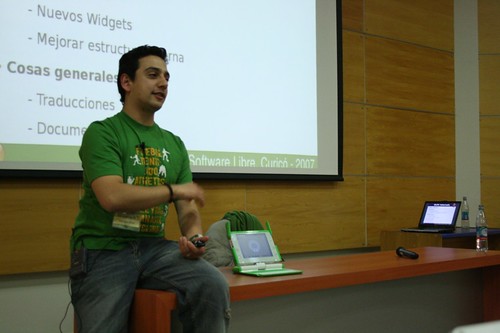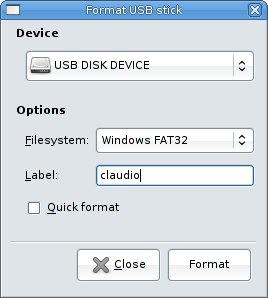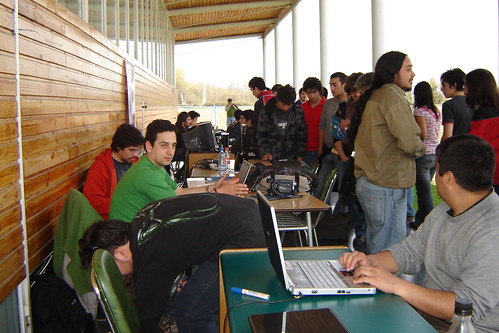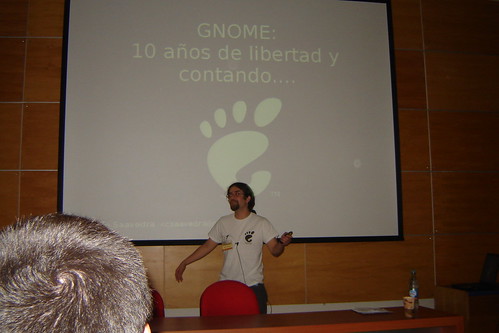Go forward in time to November 2007.
- Mon 2007/Oct/29
-
-
On November 10th, the Universidad Austral de Chile, in their Campus Puerto Montt, will host the 3rd Congreso Austral de Ciencia de la Computación, whose main topic for this edition is Free Software.
I've been invited to give a talk/tutorial on how to contribute with code to the GNOME project, so I'll arrive the night of the 8th in Puerto Montt. This is very exciting because I've never been in the southern regions of Chile before, and I'm really eager to get to know some GNOME enthusiasts from the south. So if you live in the southern regions, I really wish to see you there!
If everything goes well, I'll take a one or two days trip to Chiloé before coming back to Curicó. The congress and the days in the south look really promising!
-
- Sun 2007/Oct/28
-
-
Divididos will be playing in the Teatro Teletón in Santiago in December 8th! Wohow!
-
- Thu 2007/Oct/25
-
-
Now that I decided to use git to maintain the source code for the work of my dissertation and solve this way the two more important issues for me (that is, version control and transparent backup), I sat and watch the Torvalds' talk on git. Very interesting (despite the humour) and now I get a better idea on what DSCM is.
-
Kinda late, as usual, but never late enough: A quick and dirty summary on the celebration of the Día del Software Libre Curicó '07. We celebrated this event about two weeks after the International Software Freedom Day, because our national holiday is really close to it, and celebrating it that day would mean that either half of the people present drunk, or we don't get attendants (and probably speakers) at all. This was definitively a good move, as, from one side, it gave more time to us the inexpert organizers to handle everything, and on the other hand, everyone (speakers, organizers, and attendants) had already recovered from the never ending hangovers from the dieciocho.
I wrote some notes from an organizational point of view (spanish) of the ups and downs of the conference, so you can check them in detail, if interested. Either way, some of the points I consider more relevant follow.
First of all, I'm really happy with the number of attendants. We had 200 copies of the OpenCD to give away, and we couldn't give every person a copy, so please get a idea of the numbers. The day before the conference, we closed the registration after having ca. 340 people registered to attend. We had estimated to achieve about 200 people registered and 100 attendants, but somehow we managed to get more than twice the people we wanted. That's certainly one of the most amazing things that happened.
The level of the talks was pretty good and I think there was (in almost all the talks) a a strong connection between audience and speakers, which resulted in both of them going home really happy. I think this is a very valuable point, as I've been in a few free software events in Chile where, unfortunately, despite the good level of the speakers, attendants got lost and probably bored quickly. This didn'T happen in our event, so I want to thank again all the speakers for doing such a great job!
One thing I really missed was more press coverage during the event. Yes, we sucked at getting attention from the media. We only had people from El AMaule (a local citizen's journalism web) covering the event. We didn't have press coverage from the university magazine either, but at least they published a small note in the printed edition. (ok, with some awful typos: "Gnomo" and "One laptop per Chile", but I'm working on getting them rectified in an errata. So it goes.)
Also, it was kinda sad to see that the only academic from the faculty who attended was a Physician who is nowadays migrating to GNU/Linux and wanted to know more about Free Software in general, but no Professors from the Computer Science department. I'd say we invited all of them, and a couple excused from coming for personal reasons, but the others didn't even appear. Sad, sad, sad.

Picture by Juan Carlos InostrozaOverall, I'm very happy and proud of what we achieved. After the day, I feel that many of the guys from the faculty got to know some of the local heroes and they'll probably get closer to the local communities and contribute somehow to the spread of Free Software, and maybe a couple of them will begin contributing actively to projects. With that, I can say I'm pretty happy.

Picture by Pedro VillavicencioThere's a group in Flickr with pictures from the day. Check them out!
On a personal note, I think that organizing such an event is a wonderful experience and everyone should try it at least once. Ok, this is not as big as Encuentro Linux nor GUADEC, but after all, it was a lot of work anyway. I think I learnt a lot in the past simply by reading threads of discussions regarding the organization of some events, and with the Día del Software Libre, I got the opportunity to put in practice what I learned. It seems it worked!
-
- Mon 2007/Oct/22
-
-
The other day, Felipe, a friend of mine, came with a USB stick he found on the street and asked me to format it. He was surprised that I had to dig into man pages and google to find out how to do it and said "Why don't you just right click in the device icon and choose format"?.
It was a bit embarrassing to tell him that we in GNOME don't have currently a USB stick formatting tool, so I told him I'd write one in the next days to make things easy.
So, I did it. I wrote garon, a simple tool for formatting USB removable drives, which following the KISS principle, won't allow you to do any fancy thing with the drive, but just to format it, set the label, and that's it. Here's the mandatory screenshot.

It currently uses tools like sfdisk, mkdosfs, and mkfs.ext3 to do the hard work. The existing drives are detected using HAL. The UI needs some polishing and there are still a few things I would like to do with it (like recognizing plugged/unplugged USB sticks), but today, talking with Emmanuele, I discovered there is already an effort to replace gfloppy with such a tool. So now I wonder if it is worth the effort to keep on hacking on it. :-(
Anyway, if there's anyone interested on this still experimental piece of code, here's a tarball. Please send me any comments you may have about it. And remember, don't use it unless you are brave, as it could kill your cat and burn your house!
Thanks to Cristian for lending me a USB stick to play with it.
-
A brief and nice tutorial of The Gimp was published in one of the local computers magazines. It is worth mentioning it, because it's a magazine for the general public, so it' a great thing that they are finally including articles about free software. The only thing I dislike is the title of the article, but life isn't perfect!
Revista Mouse: Taller: Aprende a "photoshopear" con Gimp
-
- Wed 2007/Oct/10
-
-
Some time ago I wrote a patch for gaim-rhythmbox. It was probably a silly feature for teenagers and not really relevant, but it was code I wrote, after all. Today, I wanted to show one of my mates how simple it is to hack, and was looking for the patch I wrote in the code.google.com site for gaim-rhythmbox, and realized this doesn't exist anymore.
Ok, nothing really surprising here, as gaim changed its name to pidgin. So I went to the pidgin-rhythmbox site, and realized that my report doesn't even exist there. Not that the report was closed as WONTFIX or NOTABUG, but it does not even exist.
So, now I'm left with the feeling that I should've made a backup of the patch. I've always believed that my laptop is not the proper place to store patches and that's why I always trust the bug trackers of projects. Now I see that not every free software developer out there takes their contributors as seriously as the GNOME community does.
Conclusion, even when this is not directly related with the pidgin developers, I'm definitively not going back to pidgin. Empathy may not be ready, but it's good enough for me. And it's part of a community where contributors are respected. And I am sure their developers will appreciate every kind of feedback, patches, and contributions I can make in the future.
-
- Sat 2007/Oct/06
-
-
After having been sucked by facebook, I discovered that at least Chileans have some typical misconceptions in the meaning of certain academic-related terms. Mostly, this seems to happen because these concepts have a similar word in Spanish, which unfortunately, mean something different. Here's a quick list for the Spanish speakers in facebook (and other interested ones). Definitions are taken from Google.
- Alumn: a graduate or former student of a school, college or university. This is usually confused with the Spanish word alumno which, at least in Chile, is used to refer to a current student of a university or college.
- Graduate student: A student who holds a bachelor's or first-professional degree, and is taking courses toward an advanced degree such as a Master's degree or a Ph.D. This is typically confused with the term estudiante graduado, which people use to refer to someone who has already finished her/his lectures and is preparing her/his dissertation or thesis.
- Class of 'X: It means that you graduated or are going to graduate in year X. This is confused by some people who refer with this to the year they began their studies.
- Alumn '02: As a combination of the above mistakes, some people use this to express they are current students since 2002. This actually means that, of course, they supposedly graduated on 2002. The correct term would actually be Uni 'XX, where Uni stands for you college and 'XX for the year when you think you may graduate.
This small note is courtesy of sucked-by-facebook.cl. No facebook users were harmed during the preparation of these notes.
-
- Mon 2007/Oct/01
-
-
I've put the slides of my talk from the Día del Software Libre, Curicó '07 online. Even when it's in Spanish, I'd recommend you to take a look at it. This is by far the best talk I've ever given, as people was really connected with me, and seemed to have enjoyed it a lot, even when I didn't talk about all what I wanted (I missed talking about the future of the desktop and the projects that nowadays complement GNOME).
GNOME: Diez años de libertad y contando.
I'll write about the event pretty soon. In the meantime, I can say that it was a total blast.
-
Go backwards in time to September 2007.


